On this page:
- Coed and the girls' school
- Students
- Boarding school
- High school graduates
- Teachers
- The uniqueness of the Catholic school
- International exchanges and scholarships
- Help with paying tuition fees
- Teaching programs
- Achievements
- History of the school

Our Kids interviewed Sister Karolina Łuczak, Principal of the Primary and Secondary Schools of the Sisters of Nazareth.
Here is a video of this interview (in Polish), illustrated with photos. Below, you can read its transcript:
Coed and the girls' school
Our Kids: Your school consists of a primary school, where boys and girls study, and a high school, only for girls. Why did you decide to introduce two different models at these two levels?
Sister Karolina Łuczak: Our history as a single-gender school goes back to the pre-war times, when it was a natural model of education, and this is how our high school survived. After the Second World War, the communist authorities did not allow us to run an elementary school. Therefore, only high school remained, as a girls' high school. In the meantime, there was also a middle school (gimnazjum). And in 2017, when the next education reform was implemented, we decided to introduce primary school, responding to the needs of families who reported that they would like boys to be able to study at our school too. We decided that the school would be coed, but the classes would remain single-gender, so we have separate classes for girls and boys, which works very well. During lessons, kids are separated, while breaks, extracurricular activities, and all kinds of outings or educational trips are co-educational—boys and girls participate in these activities together.
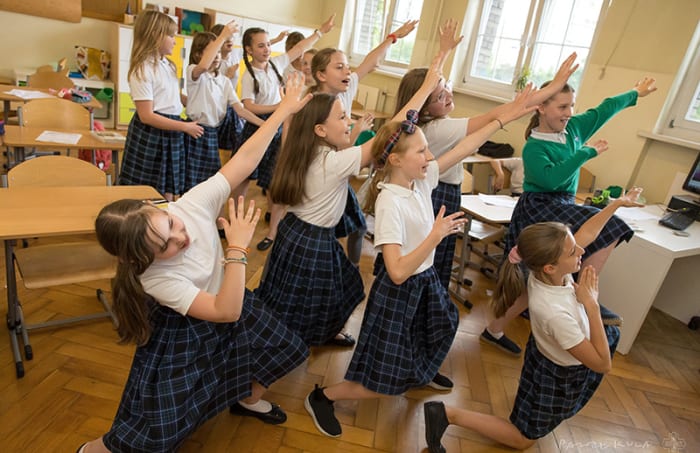
Students
Our Kids: Please tell us about the students of the schools.
Sister Karolina Łuczak: Our primary school is for students from Warsaw and the surrounding area because there is no boarding, so the question of getting there plays a very important role. We are a Catholic school, meaning many families who choose our school partly because of their religious character. As for high school students, due to the fact that we have boarding, we already have girls not only from different parts of Poland but also from other countries, because the boarding school allows it.
Boarding school
Our Kids: How does the boarding school work and what are the advantages of such an institution?
Sister Karolina Łuczak: Girls living in the boarding house are the closest to the school because it is in the same building. And this is the first important benefit because in Warsaw it takes a lot of time to travel to school and return home. Therefore, our dormitory is also chosen by girls from the vicinity of Warsaw so they can save time not having to commute. About 30% to 40% of our students live in the dorm, depending on the year. Girls spend a whole week there, and sometimes even a month or more. Especially those from outside Poland. This makes the boarding school a second home for them. We try to make the atmosphere in the boarding school as family-like as possible. All these years have shown us that the friendships made in the boarding school are long lasting. Our graduates emphasize that they stay in touch more often with their friends from boarding school than from university. We also see it at our reunions that we organize for our graduates every year.
The girls live in single and double rooms, sometimes in triple rooms. The conditions are very good. Recently, the dormitory has been renovated. They have their own rooms, a place where they can study. The school is nearby so they also have easier interactions with the teachers, especially the sisters who are teachers and who also live here. As a result, girls sometimes use the evening hours to review the lessons with their teachers.
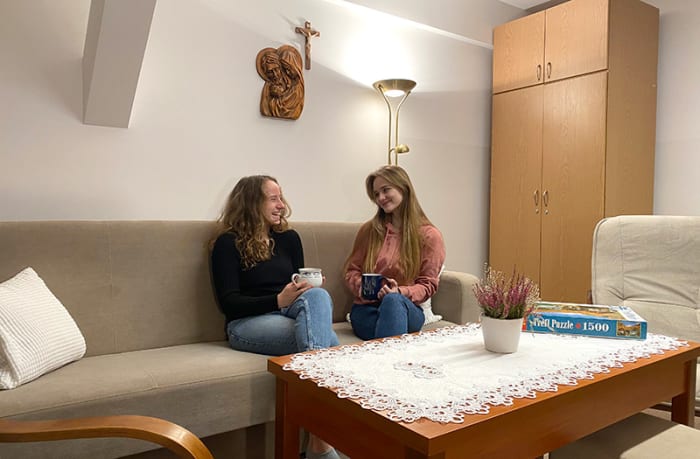
High school graduates
Our Kids: Where do high school graduates continue their education?
Sister Karolina Łuczak: Due to the fact that our high school does not have profiled classes, and girls have the option of individual selection of extended subjects: everyone can choose the subjects they wish. This means that our graduates are well prepared to study medicine, foreign languages, business, and architecture. It is also difficult to list the fields of study they choose most often, because when the girls decide that they want to go to a given university, the school enables them to do so, also due to the fact that we have the International Baccalaureate Programme. The girls have many options and some go to study abroad. And, of course, they are very well prepared for that.
Our Kids: Are there many girls who graduated from your primary school and then continue their education in your high school?
Sister Karolina Łuczak: We have had primary school graduates for only two years because before that there was a middle school. About 50% of the girls stayed with us. Now, in primary school, these numbers will probably be slightly lower because there will be children who will be with us for eight years, so some of them will also be looking for a different and new experience. But we will see. For now, these are still just the beginnings with primary school graduates.
Teachers
Our Kids: Please tell me about your teachers.
Sister Karolina Łuczak: We have 400 students and 85 teachers, so even this ratio shows that children and young people are very well looked after. It also means that the classes have few students. Working on extended subjects is carried out in groups of just a few students. The teachers who work with our students are a group of extremely devoted people—devoted and dedicated to young people.
There are 15 Nazareth Sisters among the teachers. There is also a large group of our graduates who finished high school and after many years returned to the school in a different role—as teachers, which is also a great asset because they know and understand what it means to be a student of Nazareth. Our teachers also care very much about their professional development. Consequently, we have a large group of teachers who are qualified to teach the International Baccalaureate Programme and bilingual classes, both in primary and high school. Many teachers are also fluent in English. A large group of teachers also have various types of certificates, are language examiners, and also teach other subjects, especially in the International Baccalaureate Programme. And of course, they also prepare students for the high school leaving exams (matura) and eighth-grade exams.
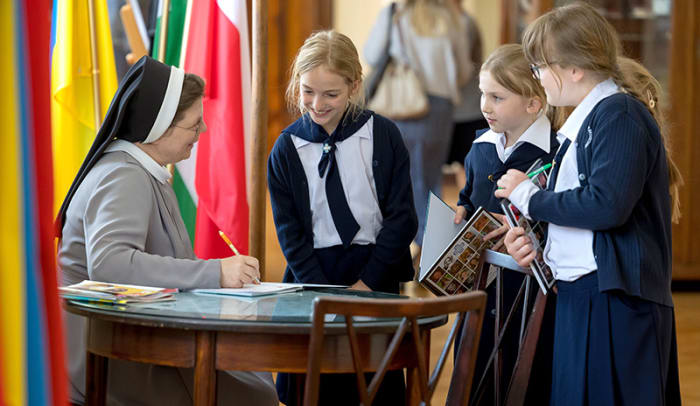
The uniqueness of the Catholic school
Our Kids: How many Catholic schools are there in Poland?
Sister Karolina Łuczak: There are about 400 Catholic schools at various levels, definitely more at the primary school level.
Our Kids: What does studying at a female-only Catholic high school look like in the 21st century?
Sister Karolina Łuczak: Our school is really a Catholic one. This means that the values that accompany us here are Catholic values. Every day we try to live by these Christian values. In terms of religious practice, being in a Catholic school usually means starting the day in the classroom with a short prayer, together with the classmates and the teacher. Various school celebrations are also connected with religious elements, for example, with participation in a holy mass or a service. But these are, of course, selected days, while everyday life is simply everyday school life and the most important thing is what values we live by.
In our school, the vast majority or almost all of the students come from Catholic families, but we also have a group of girls of other faiths, and there is a place for them too. They are Orthodox, Greek Catholics. There are also Protestant or Buddhist students. All those who want to be in our school, of course, keep their religion, their creed, but by coming here, they are obliged to show respect for the values that are observed in our school. Due to the fact that this group of girls of other faiths is quite significant, especially now that we have also admitted Ukrainians, mainly Orthodox students, we can see an educational value where we learn to live and respect each other in our small school community, preserving our individuality but also showing respect.
Our Kids: In the present system of public schools children also learn religion. How is it different from what they learn at your religious school?
Sister Karolina Łuczak: Teaching religion in terms of the number of hours is the same as in public schools, i.e., two hours a week. The difference may be that in our school religion lessons are compulsory, which is obvious due to the Catholic nature of the school. Girls of other faiths participate in these religion lessons. But religion lessons are also a time when you can get to know other faiths. The presence of these girls from other religions is enriching. Then it is not the teacher who has to answer questions about the differences between these religions but the girls themselves share their experience.
I think that some elements of religious life are also used a bit differently in Catholic schools. So, for example, before Christmas we organize one Advent day, without lessons, when girls can use the time to better prepare themselves spiritually for Christmas. Usually, we invite some interesting people, e.g., priests who help to experience this day spiritually. A very interesting initiative is also the Lenten retreat, which is customary in Polish schools, including public schools. On the other hand, we try to provide a good use of time. Then the girls go to the nearby retreat houses. And this is the time actually spent together, where they can not only be together but in such an atmosphere there are more opportunities to share their spiritual religious experience, the difficulties that girls often struggle with in adolescence, including finding their own place, with an understanding of the often difficult situation of the Church in public life. The presence of priests or sisters who accompany them helps them to open up and to grow and mature in their faith.
International exchanges and scholarships
Our Kids: I've read about many international exchanges. I understand that the school has various interesting contacts outside of Poland.
Sister Karolina Łuczak: The school has been known for years for placing quite a lot of emphasis on foreign languages. It is already visible in the number of hours. From Grade 1, children have five hours of English and two hours of a foreign language—French and German to choose from. In high school, it is even more noticeable in the number of hours—there are even more, but of course the most attractive language learning is when it can be put into practice. Therefore, we try to establish as many contacts with other schools as possible and organize exchanges. Of course, the pandemic stopped that, but we are slowly returning to our old ways and starting international exchanges in September. For example, we have been in contact with a Japanese school for many years and the girls have the opportunity to go to Japan and then host their friends here. We also organize exchanges, for example, with a Piarist school for men in Budapest, Hungary, with a school in Spain, and with a school in the Czech Republic. We are now preparing an exchange with schools in Germany and Italy. Every year there are new opportunities and we are very eager to make use of them.
During the pandemic, because trips could not be organized, we held online meetings, which was also a very interesting experience. Recently, our high school students met Japanese girls because the other side was very interested in our experience with the war in Ukraine. It was a very interesting and unique experience. In high school we have a large group of girls from Ukraine who have been in our school for several years so their observation of the war from a distance is also unique. But we have a group of refugees who joined us during the war and they also shared their experiences.
Yet another very interesting program is the scholarship in the U.S. Every year one, two, or three high school students go to study at an American Catholic school for a year. This experience is extremely enriching. I myself can see a huge difference in the girls returning after a year, how much they have changed, matured, how open they became to the world. At the same time, such a longer stay abroad teaches them to appreciate and respect what we have in Poland. Sometimes it’s just the distance or a chance to compare their home country to the U,S. that shows them that they have many reasons to be proud of who they are, also because of their knowledge of English. When they go there after their first or second year of high school, it turns out that they do very well in all subjects at the American school.
Help with paying tuition fees
Our Kids: You have these scholarships to the U.S., but does the school provide scholarships to help pay tuition at school?
Sister Karolina Łuczak: We have a large group of high school girls whose parents are unable to pay the tuition fees. Therefore, we try to help. We have the School of the Sisters of Nazareth Foundation which financially supports families in need of such support and help. We also have scholarships for large families. We make sure that even in a family with three or four children, they too have access to such education. So we have discounts from the second child on, and the fourth child doesn’t pay at all. There are also children and families at school who started their education with full payment, and then some unexpected situations happened. We also help in such situations. Sometimes it just means that the child does not pay at all. We never allow a child to have to leave our school for financial reasons.
Teaching programs
Our Kids: The school implements the IB Programme and is bilingual. What works best in your school as far as the curriculum goes?
Sister Karolina Łuczak: When it comes to programs, foreign languages come up once again. We already have bilingualism in our Primary School starting from Grade 1. Not only is there an increased number of English-language hours, but we introduce English-language elements in selected subjects. And with each year there are more and more of these elements. Therefore, when the kids start high school, it makes it much easier for them to succeed in IB or bilingual classes because they have to pass an English exam. And these two high school programs are very popular. We have a separate class with an International Baccalaureate Programme and a bilingual class, where girls can further develop their language skills and then use them at later stages, sometimes also in their studies. Some girls go abroad, while others choose to study in Poland with English as the language of instruction, because that also prepares them for the next stage—starting a job.
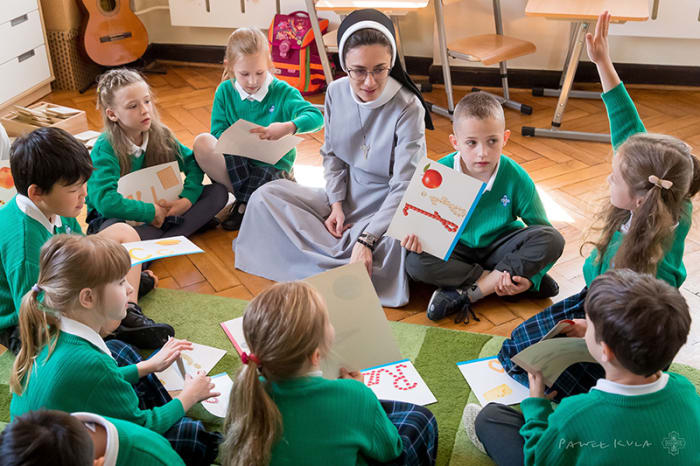
Achievements
Our Kids: And what are you most proud of? What are the school’s greatest achievements?
Sister Karolina Łuczak: I guess that we have managed to make our school like a family. We try to make our students who come to school feel good. That is why I’m glad to notice kids come to school early in the morning and don’t want to go home. We also try very hard to make sure that there are many extracurricular activities. I’m deeply convinced that the child's development is not only those 40 minutes spent in the classroom but it is every initiative, every action that develops their creativity after the lessons. That’s what we do in our school—we offer a rich program of extracurricular activities. The children stay until around 4 p.m. engaged in various types of sports activities—soccer, volleyball, judo—and arts, music, science and biology activities, some experiments, and drama. There are definitely more than 20 options, so kids really have a lot to choose from. And we see how beautifully they develop. The joy of kids and their happiness is our greatest value.
History of the school
Our Kids: What is the history of the Nazareth school?
Sister Karolina Łuczak: The beginnings of our school go back to 1919. The Nazareth Sisters came to Warsaw right after Poland regained independence. And as the chronicles of the city and our congregation show, the sisters wanted to participate in the rebirth of Poland through education, so immediately, in the next school year they launched a primary school. And we are still in this building in which we have been since 1924.
The school is truly unique in its history, as it was one of 10 Catholic schools that have survived the entire period, including the communist time. Since the origins of the school date back to pre-war times and, of course, the period of the Second World War also had a significant impact on our history, the Warsaw Uprising and underground education are also related to the history of our school.
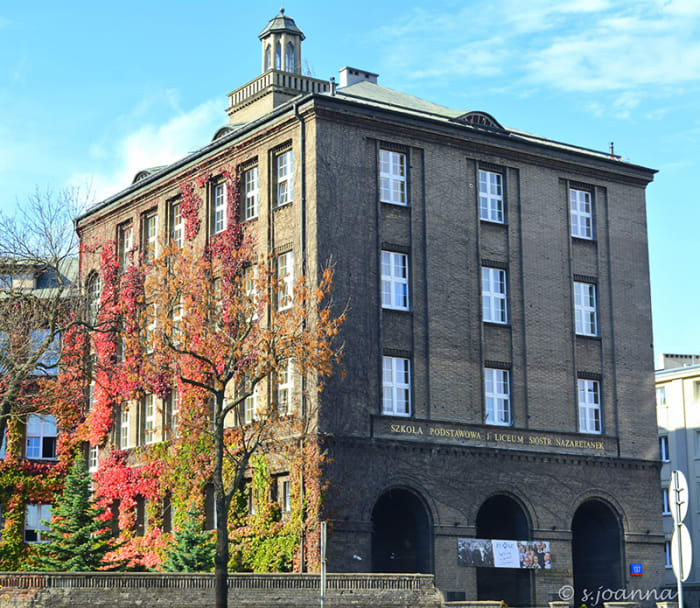
Our Kids: And how is it possible to combine such tradition with the modern face of the 21st century?
Sister Karolina Łuczak: We are truly a unique school because we are located in a building that has such historic value. World War II significantly damaged our building but nevertheless it survived. Therefore, every day we walk around places, rooms, and classrooms that are closely related to the school’s tradition and history. But at the same time, we, as Nazareth Sisters, also try to respond to the changing needs of the families and kids on an ongoing basis. For instance, our teaching methods and school equipment are as modern as possible.
People who read this also viewed:
- Private schools Warsaw
- Private day schools in Warsaw
- International schools in Warsaw
- Boarding schools in Warsaw
- Montessori schools in Warsaw
- Private high schools in Warsaw
- Private primary schools in Warsaw
- Preschools in Warsaw
- Non-public schools in Warsaw
- Private language schools in Warsaw
- Types of schools in Warsaw
- Private Catholic and Christian schools in Warsaw
- International Baccalaureate (IB) schools in Warsaw
- Warsaw preschool costs
- Private special needs schools in Warsaw
- Our Kids Interview: Get to know Thames British School
- Our Kids Interview: Get to know PRIMUS Non-Public Primary School No. 47 and Non-Public Secondary School
- Our Kids Interview: Get to know The English Playhouse and The English Primary
- Our Kids Interview: Get to know Polish British Academy of Warsaw
- Our Kids Interview: Get to know the Canadian School of Warsaw
- Mokotow High School Campus - a new Warsaw high school and Thames British School campus
- Boarding schools in Warsaw
- Boarding schools
- Boarding high schools
- Study abroad at a private school
- Our Kids interview: Get to know Regent College International Schools
- Our Kids Interview: Get to know EF Academy Oxford
- International Baccalaureate (IB) schools in Poland
- International Baccalaureate (IB) schools in Warsaw
- The appeal of the IB Programme
- Mokotow High School Campus - a new Warsaw high school and Thames British School campus
-
Advice Guide
- ABC of educational terminology: Glossary of terms and concepts
- The admissions process
- Advantages and disadvantages of studying in an international school
- The application process
- Benefits of Polish private schools
- Bilingual schools
- Boarding schools
- Choosing a private or nonpublic school in Poland
- Compare schools in Poland
- English schools in Warsaw
- Homeschooling
- International schools in Kraków
- International schools
- Private school interviews
- Music education
- Myths about private education
- Non-public schools in Poland
- School open houses
- Our Kids Interview: Get to know EF Academy Oxford
- Our Kids Interview: Get to know Open School
- Our Kids interview: Get to know Regent College International Schools
- Our Kids Interview: Get to know The American School of Warsaw
- Our Kids Interview: Get to know The British School Warsaw
- Our Kids Interview: Get to know Wrocław Cosmopolitan School (two interviews, new video)
- Poland school profiles
- Private day schools
- Gifted schools & programs
- Private Jewish schools in Poland
- Language schools
- Private school tuition and costs in Poland
- Private schools in Poland
- Private schools in Poland offering French-language immersion
- English immersion schools
- Poland school uniforms
- Private special needs schools in Warsaw
- Public versus non-public schools in Poland
- Private school questions
- Private school rankings
- Reasons for choosing private schools - Our Kids’s survey report
- Religious schools
- Schools and classes for children with ADHD in Poland
- Social primary schools
- Social Schools
- Special educational needs (SPE) certificates
- Special needs schools
- Study abroad at a private school
- The first annual non-public school fair in Poland
- The first annual Our Kids non-public school expo in Warsaw was a great success
- Third Private School Expo in Warsaw - summary
- Types of schools
- Types of schools in Warsaw
- Warsaw preschool costs
- Why private school?
- Why parents go private
-
Grades
- Boarding high schools
- Choosing a high school in Poland
- Mokotow High School Campus - a new Warsaw high school and Thames British School campus
- Montessori nursery schools
- Montessori preschools
- Our Kids Interview: Get to know English Montessori School Katowice
- Our Kids Interview: Get to know FSA School
- Our Kids Interview: Get to know KIDS & Co.
- Our Kids Interview: Get to know Polish British Academy of Warsaw
- Our Kids Interview: Get to know The English Playhouse and The English Primary
- Poland education: grade levels
- Preschools in Warsaw
- Private & non-public preschools
- Private & non-public primary schools
- Private bilingual elementary schools in Warsaw
- Private high schools
- Private high schools in Warsaw
- Private middle schools
- Nursery schools
- Private primary schools in Warsaw
- Social high schools
-
Locations
- Boarding schools in Warsaw
- English schools in Kraków
- International Baccalaureate (IB) schools in Warsaw
- International schools in Warsaw
- Montessori schools in Warsaw
- Non-public schools in Warsaw
- Our Kids Interview: Get to know EF Academy
- Our Kids interview: Get to know Excellence in Education better
- Our Kids Interview: Get to know PRIMUS Non-Public Primary School No. 47 and Non-Public Secondary School
- Our Kids Interview: Get to know the Canadian School of Warsaw
- Our Kids Interview: Get to know The Primary and Secondary Schools of the Sisters of Nazareth in Warsaw
- Private Catholic and Christian schools in Warsaw
- Private day schools in Warsaw
- Private language schools in Warsaw
- Private schools in Bialystok
- Bydgoszcz schools
- Częstochowa schools
- Private schools in Gdańsk & Gdynia
- Katowice schools
- Private schools in Krakow
- Lublin schools
- Olsztyn schools
- Private schools in Poznań
- Private schools in Rzeszów
- Szczecin schools
- Private schools Warsaw
- Private schools in Wrocław
- Zielona Góra schools
- Private schools in Łódź






 POL
POL CAN
CAN